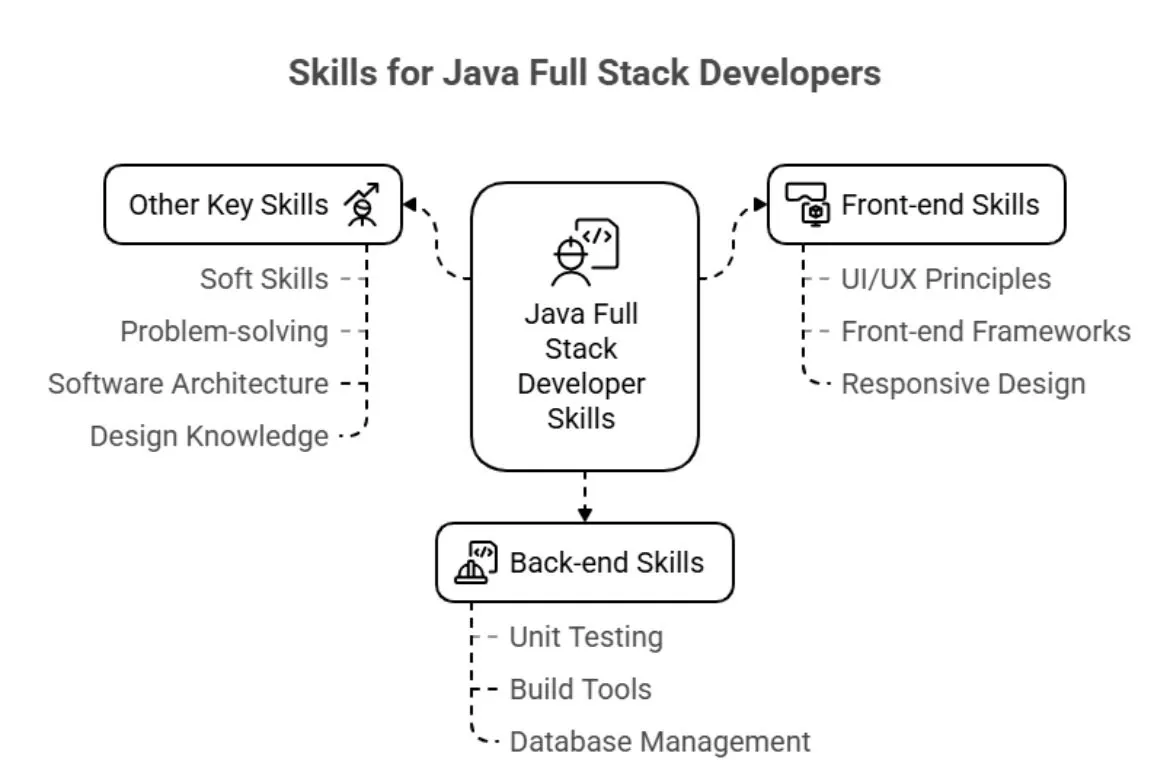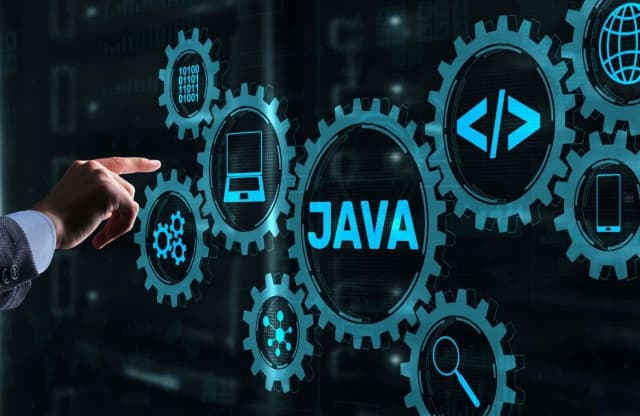The Essential Java Full Stack Developer Skills That Employers Want

As we step deeper into the digital decade, the demand for skilled Java Full Stack Developers continues to surge across India’s rapidly growing tech industry. From fintech startups in Bengaluru crafting intuitive UPI-based apps to edtech platforms in Hyderabad scaling real-time video learning for millions, full stack professionals are the engines driving innovation forward. But what exactly are the skills that employers are seeking in 2025?
Let’s dive deep into the ocean of skills that make a java full stack developer stand out in the crowd!
What is Java Full Stack Development?
Java full stack development is a complete approach to building web applications. Developers use Java-based technologies throughout all application architecture layers. Unlike specialized roles, Java full stack developers work on both user-facing components and server-side logic with a unified technology stack.
Java full stack development uses Java as the main programming language in all application layers. This approach makes the development process simpler through a single language and tech stack.
Who is a Full Stack Developer?
A "full stack developer" is a tech professional who masters both front-end (client-side) and back-end (server-side) technologies. These developers work on the entire "stack" of applications and websites instead of focusing on one area. They handle everything from user interfaces to databases.
A full stack developer's strength lies in understanding the complete software lifecycle. They connect different technical areas and help team members communicate better, which leads to faster development. Their adaptability lets them switch tasks naturally and often reduces project timelines.
Essential Technical Skills for Java Full Stack Developers
Java full stack developers need specific technical skills to excel in 2025. The job market demands professionals who can handle both client-side and server-side development skillfully. Here are the technical capabilities that will boost your value in the industry.
1. Core Java and OOP concepts
Core Java and object-oriented programming principles are the foundations of your technical expertise. Your ability to work with Java's four key OOP pillars, encapsulation, inheritance, polymorphism, and abstraction, helps you write modular, maintainable, and adaptable code.
2. HTML, CSS, and JavaScript
Full stack developers must excel in front-end development. HTML provides content structure, CSS manages layout and styling, while JavaScript adds interactivity to web pages. These languages create the foundation of web interfaces.
3. Java frameworks
They makes application development easier by simplifying setup and configuration. The framework offers auto-configuration, embedded web servers, and strong security options.
4. Working with databases
Data management requires solid database expertise. You should know how to work with relational databases for structured data and NoSQL databases for flexible, unstructured information. Hibernate knowledge helps bridge Java objects and database tables efficiently.
5. API design and integration
Today's applications depend on APIs for component communication. Knowledge of HTTP methods (GET, POST, PUT, DELETE), status codes, and RESTful design principles is essential.
Front-end Skills for Java Full Stack Developers

Your application's visual interface creates the first impression on users. Front-end skills play a vital role for Java full stack developers. You need to create accessible, responsive, and visually appealing experiences that keep users hooked to your applications, not just write functional code.
Understanding UI/UX principles
UI/UX basics will help you build better applications as a Java full stack developer. Your designs should focus on clarity and simplicity. Clean interfaces reduce cognitive load and remove unnecessary steps in user workflows. Give users what they need at the right time instead of showing all features at once. Place common actions prominently in your interface. Less-used functions should stay tucked away in appropriate menus.
Working with front-end frameworks
React and Angular offer different ways to build interactive interfaces that work well with Java backends. React, Meta's JavaScript library, helps create interactive GUI components with reusable code. It uses one-way data binding, which makes it faster and smaller than Angular, perfect for single-page applications.
Responsive design and accessibility standards
Today's multi-device world demands responsive design. Your layouts should use percentages instead of fixed pixels. Images need flexibility with max-width properties. CSS should adapt through media queries based on screen size. Start with mobile designs first, then scale up for larger screens.
Back-end Skills for Java Full Stack Developers
Your Java application's server-side components are the foundations of functionality and performance. Back-end skills help you process data, handle business logic, and manage server operations. These skills turn user interactions into meaningful outcomes.
Unit Testing and Debugging: The Quality Gatekeepers
If development is creativity, testing is accountability. A full stack developer doesn’t ship code, they ship reliability.
For example, Swiggy's real-time updates are backed by thousands of unit tests ensuring bug-free feature rollouts.
Build Tools: The Project Orchestrator
Build tools are like backstage managers, quietly keeping the show running. They automate compiling, packaging, dependency management, and testing.
Database Management: The Memory Keeper
Behind every user interaction lies a story stored in a database. Whether it’s login credentials, product listings, or transaction history, the backend must retrieve and update this data seamlessly.
For example, Flipkart’s product catalog relies on efficient DB architecture for lightning-fast search results.
Other Key Skills Employers Look For
Java full stack developers need more than just technical skills to excel. Their complementary abilities improve their work quality and team dynamics. These extra skills help developers stand out in their careers as technology keeps changing.
Soft skills and communication
Communication tops the list of soft skills for Java full stack developers. You need to explain technical concepts to non-technical stakeholders clearly. You'll work with designers, project managers, and other developers daily. Good listening skills help you understand requirements better and work well with your colleagues.
Problem-solving and debugging
Complex Java code debugging needs patience and practice. You should become skilled at setting breakpoints strategically. Code segmentation and error message analysis help isolate problems quickly.
Understanding software architecture
Good architectural knowledge leads to better long-term project decisions. Full stack developers must understand how components work together across the application stack, creating strong, maintainable systems.
Basic design and wireframing knowledge
Simple wireframes work best. They outline features without unnecessary details. With familiar navigation and clear action buttons, users feel confident. A clean, uncluttered interface creates better user experiences.
How to Develop and Improve These Skills?
To build and refine your Java full-stack skills, you need strategic practice and continuous learning. The right approach will help you master application development at every level while keeping up with industry needs.
Practice through internships and freelance work.
Nothing beats hands-on experience to develop your skills. You can find many work-from-home full stack development internships. Just filter your search for "Full Stack Development" and you're good to go. These opportunities come at no cost and give you ground experience. You'll work on projects of all types and build your portfolio. These experiences help you apply what you've learned to solve business problems.
Use Online platforms
These platforms suggest a simple approach - master HTML, CSS, and JavaScript before you move to back-end languages like Java. They offer updated learning paths for different development specialisations, including Java. These structured paths help you avoid learning gaps that could slow down your career growth.
Stay updated with Java ecosystem trends
The Java ecosystem keeps changing, so you need to keep learning. Reading influential blogs and being part of developer communities helps you stay current with new technologies and best practices. Open-source Java projects give you hands-on experience with current technologies.
Learn from online courses and bootcamps
Specialised programmes speed up your skill development and offers complete Java full stack specialisations with projects that mirror ground scenarios And provide industry-focused training with placement support, resume building sessions and mock interviews. These programmes include capstone projects that showcase your abilities to employers.
Why Java Full Stack Developers Are Crucial in the Digital Era?
Java full stack developers have become vital assets for businesses in today's ever-changing tech world. These professionals connect different parts of application development and streamline processes with new breakthroughs.
- Versatility across front-end and back-end: Their expertise in both areas will give a smooth integration between front-end and back-end components that creates more unified final products. This versatility lets them work on any part of an application when needed, which makes development more fluid and responsive.
- Faster development cycles: Java full stack developers speed up product delivery because they know how to manage the entire application lifecycle. They reduce bottlenecks and create efficient workflows by eliminating handoffs between specialist teams.
- Cost-effective for startups and enterprises: Companies save money when they hire Java full stack developers, regardless of their size. They can rely on versatile professionals who handle both front-end and back-end aspects instead of hiring separate specialists, which cuts staffing costs.
- Adaptability to new technologies: Java full stack developers excel at integrating emerging technologies into existing systems. Java's ongoing development ensures it works well with modern development needs, from microservices to AI integration.
Conclusion
Java Full Stack Development is more than a trend, it’s a professional advantage. With the ability to navigate both frontend aesthetics and backend logic, full stack developers bring immense value to product teams, startups, and enterprises alike
As India aims to become a global innovation hub, with initiatives like Digital India and Make in India fueling the tech sector, And the IT sector is expected to touch $350 billion by 2026 for which the full stack developers are becoming the new backbone of software innovation, companies are actively seeking professionals who can contribute end-to-end.
This is where a Full Stack Java Developer Bootcamp becomes a game changer. Designed to deliver hands-on, real-world experience, such bootcamps offer a structured path to acquiring in-demand skills. Through real-world projects, peer learning, and industry-grade tools, it empowers you to go from coding beginner to job-ready developer in months.
The right skills, the right learning path, and the right intent- this combination can unlock your career potential and make you an asset in India’s growing digital economy.
Because ,
"When bugs appear and systems misfire, the full stack developer becomes a detective, tracing the issue from front-end hiccups to backend bottlenecks."
Frequently Asked Questions
Q1. What are the prerequisites for Java full stack developer?
To become a Java Full Stack Developer, you need strong knowledge of Core Java, OOPs, HTML, CSS, JavaScript, databases (MySQL/MongoDB), frameworks like Spring Boot, and front-end tools like React or Angular. A basic understanding of Git, REST APIs, and DevOps is essential.
Q2. How to prepare for Java full stack developer?
- Master Core Java and OOPs concepts
- Learn HTML, CSS, and JavaScript fundamentals
- Practice with front-end frameworks like React or Angular
- Build projects using Spring Boot and REST APIs
- Understand Git, databases, and basic DevOps tools
Q3. Is Java full-stack easy to learn?
Java full-stack development is moderately challenging. It's easier with a strong foundation in programming. With consistent practice, real-world projects, and the right guidance, learners can master it effectively over time.

TalentSprint
TalentSprint is a leading deep-tech education company. It partners with esteemed academic institutions and global corporations to offer advanced learning programs in deep-tech, management, and emerging technologies. Known for its high-impact programs co-created with think tanks and experts, TalentSprint blends academic expertise with practical industry experience.



